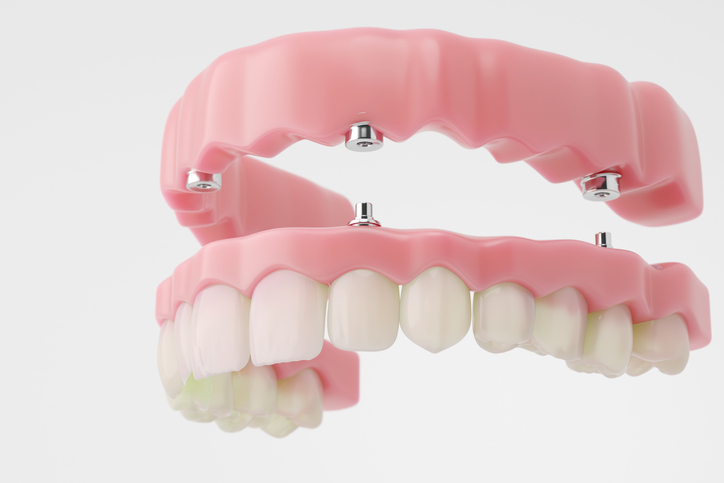
Tooth loss is more common than most people think. According to the CDC, nearly 1 in 6 adults over age 65 have lost all of their teeth, and millions more are missing one or several teeth. Whether the loss is due to gum disease, tooth decay, or trauma, replacing missing teeth is critical for your oral health, your ability to eat and speak comfortably, and your confidence in your smile.
Two of the most common solutions are dental implants and dentures. Both restore your smile, but they differ in procedure, cost, comfort, durability, and long-term health benefits. At his Babylon, NY practice on Long Island, Dr. David Scharf, a board-certified periodontist, helps patients navigate these choices with expertise in both implant dentistry and advanced prosthetic solutions.
This post will help you understand the differences, advantages, and disadvantages of dental implants and dentures—including the latest options like All-on-4® implants and implant-supported dentures—so you can make an informed decision. Ultimately, the best way to know what’s right for your situation is to schedule a consultation with Dr. Scharf.
What Are Dental Implants?
A dental implant is a titanium post surgically placed into the jawbone to replace the root of a missing tooth. Over time, the bone fuses with the implant in a process called osseointegration, creating a stable foundation for a crown, bridge, or denture.
Types of Dental Implants
- Single-Tooth Implants
- Replace one missing tooth with an implant and a crown.
- Ideal for isolated tooth loss.
- Implant-Supported Bridges
- Replace multiple adjacent teeth using two or more implants to anchor a bridge.
- Implant-Supported Dentures
- Removable or fixed dentures that snap onto implants for stability.
- Eliminate slipping and the need for adhesives.
- All-on-4® Implants
- A revolutionary solution that uses just four implants per arch to support a full set of teeth.
- Offers faster treatment and often avoids the need for bone grafting.

What Are Dentures?
Dentures are removable prosthetic appliances that replace missing teeth and gum tissue. They have been used for centuries, though modern dentures are far more comfortable and natural-looking than their predecessors.
Types of Dentures
- Complete (Full) Dentures
- Replace all teeth in an upper or lower arch.
- Rest directly on the gums.
- Partial Dentures
- Replace several missing teeth while preserving healthy natural teeth.
- Attach with metal or acrylic clasps.
- Implant-Supported Dentures
- A hybrid option that combines dentures with the stability of implants.
- Can be removable (“snap-on”) or permanently fixed.

Comparing Dental Implants and Dentures
1. Appearance and Function
- Implants look, feel, and function like natural teeth. They preserve the jawbone and facial structure, preventing the “sunken” look that comes with tooth loss.
- Dentures can restore your smile but may feel bulky, and over time, jawbone shrinkage can cause dentures to slip or fit poorly.
2. Comfort and Stability
- Implants stay securely anchored in place. You can eat, speak, and laugh without worrying about movement.
- Dentures may shift or require adhesives, especially after years of wear.
3. Longevity
- Implants can last decades with proper care—often a lifetime investment.
- Dentures typically need replacement or relining every 5–7 years.
4. Oral Health
- Implants stimulate the jawbone like natural teeth, preventing bone loss.
- Dentures do not stimulate the bone, which can accelerate resorption and change your facial appearance over time.
5. Cost
- Implants generally cost more upfront, but they offer long-term value because they last longer and protect oral health.
- Dentures cost less initially, but ongoing maintenance, relines, and replacements add up over time.
- Dr. Scharf has written extensively about implant costs in his blog post on dental implant cost. While implants represent a bigger investment, their durability and health benefits often outweigh the higher upfront expense.
The Procedure for Dental Implants
- Consultation & Exam – Dr. Scharf uses 3D imaging to evaluate your bone structure, gums, and overall oral health.
- Preparatory Procedures (if needed):
- Bone grafting or ridge preservation strengthens the jawbone for implant support.
- Sinus lift may be required for implants in the upper back jaw.
- Implant Placement – A titanium post is surgically placed into the bone.
- Healing Period (Osseointegration) – Bone fuses with the implant over 3–6 months.
- Abutment & Crown – A connector (abutment) is attached, and a custom crown, bridge, or denture is secured.
For All-on-4® implants, many patients can receive temporary teeth the same day as surgery, dramatically shortening the treatment timeline.
The Procedure for Dentures
- Consultation & Impressions – Molds of your gums and teeth are taken.
- Fabrication – A dental lab creates dentures to fit your mouth.
- Adjustments – Several appointments may be required to ensure proper fit and comfort.
- Long-Term Care – Dentures need relining or replacement over time as your jawbone and gums change.
Care and Maintenance
Dental Implants
- Brush and floss daily, just like natural teeth.
- Attend routine checkups and cleanings.
- Avoid smoking, which can increase the risk of implant failure.
Dentures
- Remove daily for cleaning.
- Soak in denture solution overnight.
- Avoid hot water, which can warp the acrylic.
- Keep gums and tongue clean to prevent infection.
Advantages and Disadvantages at a Glance
| Feature | Dental Implants | Dentures |
|---|---|---|
| Appearance | Natural look and feel | Natural-looking, but may appear less lifelike |
| Comfort | Stable, no slipping | Can shift, may require adhesives |
| Durability | Can last decades or a lifetime | Typically last 5–7 years |
| Bone Health | Prevents jawbone loss | Accelerates bone resorption |
| Cost | Higher upfront, long-term savings | Lower initial, higher lifetime maintenance |
| Procedure | Surgical, requires healing time | Non-surgical, quicker results |
Why Choose a Periodontist for Implants and Dentures?
While many general dentists offer implants and dentures, a periodontist like Dr. Scharf has specialized training that makes a critical difference:
- Advanced Surgical Expertise – Periodontists are specialists in gum and bone health, crucial for successful implant placement.
- Bone & Gum Management – Procedures like sinus lifts, ridge preservation, and bone grafts are routinely performed by periodontists.
- Higher Success Rates – Periodontists often achieve higher long-term implant success due to precise placement and management of complex cases.
- Comprehensive Care – From treating gum disease to replacing missing teeth, a periodontist ensures every aspect of your oral foundation is healthy.
Which Is Right for You?
The decision between dental implants and dentures depends on many factors:
- How many teeth you are missing
- The health of your gums and jawbone
- Your budget and long-term goals
- Your lifestyle and comfort preferences
For some, a traditional denture is the right choice. For others, implants or implant-supported dentures offer the best mix of stability, health benefits, and long-term value.
Schedule a Consultation with Dr. Scharf in Babylon, NY
Choosing between dentures and dental implants is not a one-size-fits-all decision. Only a comprehensive exam can determine what will give you the healthiest, most comfortable, and most natural-looking result.
As a trusted Long Island periodontist, Dr. David Scharf has helped thousands of patients restore their smiles with customized treatment plans. Whether you are considering traditional dentures, implant-supported dentures, or full-arch All-on-4® implants, his expertise ensures the best possible outcome.
Visit Dr. Scharf’s office in Babylon, NY, serving all of Long Island.
Call today to schedule your consultation and discover the best solution for your smile and your health.

